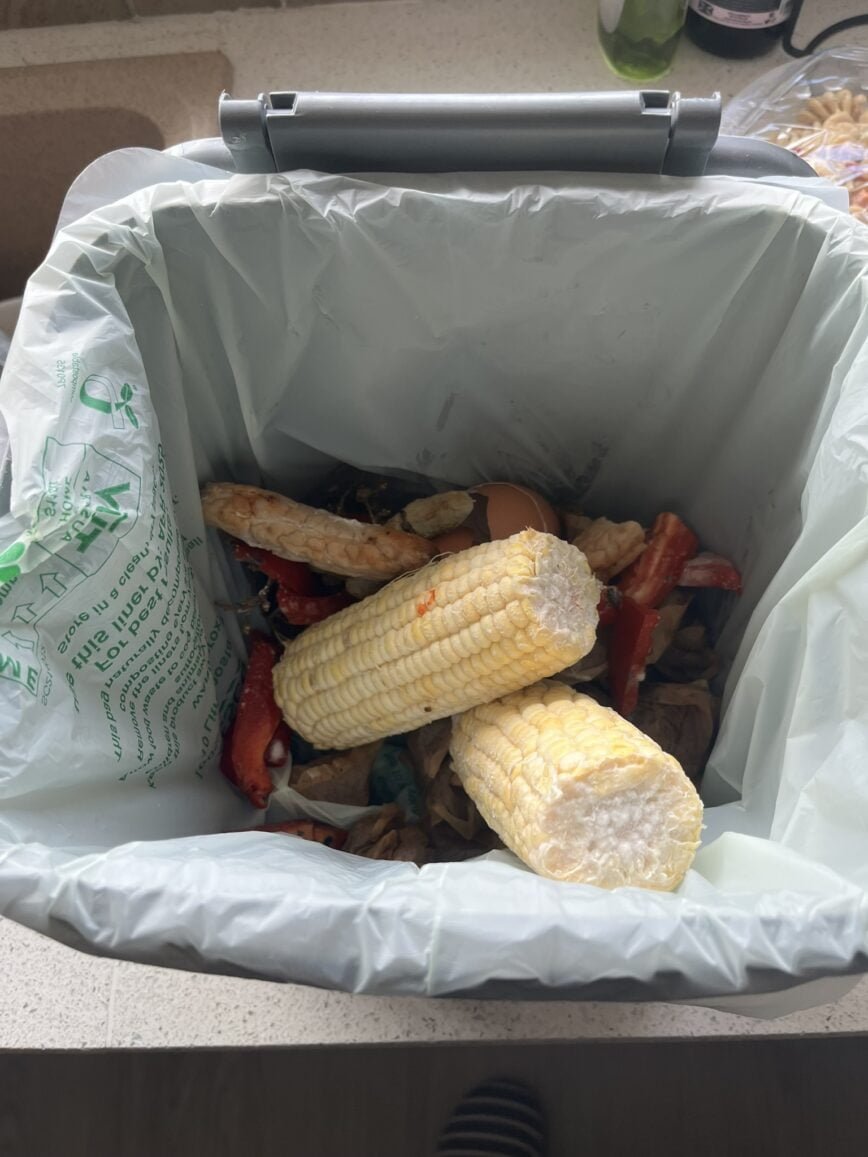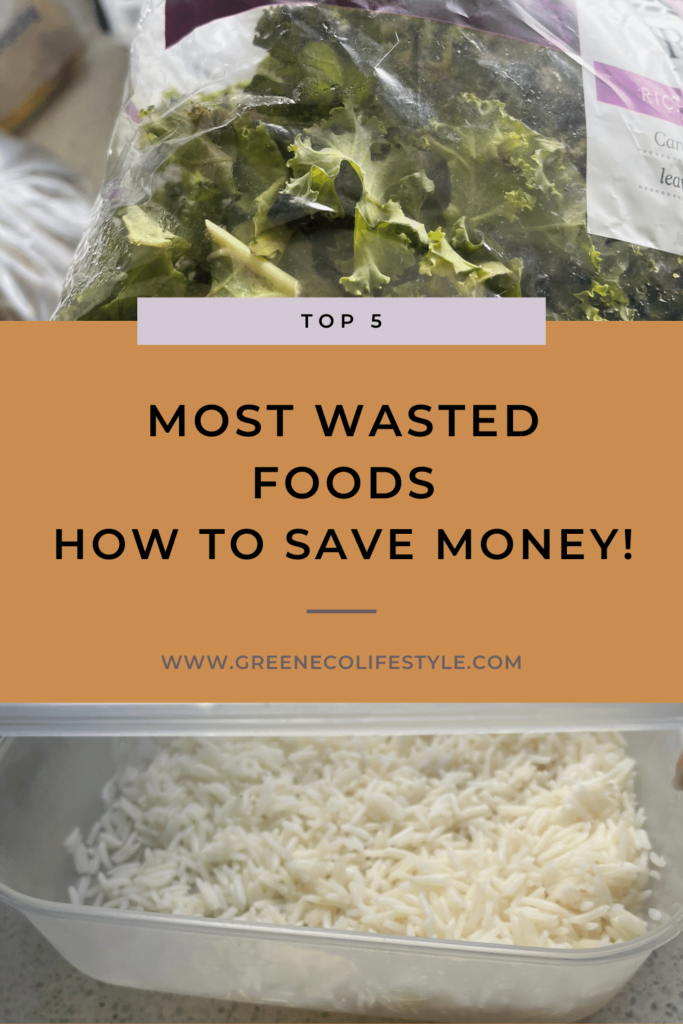
The Scale of The Food Waste Problem
Let’s face it, we’ve all been guilty of wasting food that we haven’t eaten in a few days. As the food waste piles up in our fridge it’s easy to think that we can just compost or throw it away and everything will be fine.
We need to face the fact that in the UK and globally, we have a problem with food waste! In this article, I’ll discuss the top 5 most wasted foods and discuss how to prevent food waste.
Lastly, I’ll answer some FAQ’s and don’t forget to grab your copy of my Family Food Waste Audit which I use in this article to save money and my family’s reduce food waste.

Quick Links
Disclaimer: This article may have affiliate links to products mentioned throughout. If you were to purchase a product, I may make a small commission from the sale which supports this blog. Read my privacy policy and disclosure page for details.
The Top Most Wasted Food Categories and Items
Let’s dig into some wasted food facts. Food waste is defined as surplus food that is thrown away and not eaten. We all love food, hate waste and want to increase food shelf life to make food last longer. According to Food Wraps Food Waste 2023 Report.
The average UK household throws away 10 million tons of leftover food items per year. The average UK family buys 43 million tonnes of food annually so we waste 22% of food per year!
Food Waste creates 25 million tonnes of greenhouse gas and is a huge net contributor to climate change. Whilst we need to do more to influence good practices in the food industry there are steps we can take now to reduce food and our environmental impact.

Top 5 Most Wasted Foods
Let’s have a look at examples of food waste in households. These percentages are mainly UK-focused but the percentages are very similar for the United States and other Western countries.
Supermarket Food Waste Statistics UK
Bread: Assuming an average cost of £1 for a loaf of bread, and considering there are about 13 slices per loaf, we can estimate the cost of wasted bread per year:
£1 (cost of a loaf) / 13 (slices per loaf) * 240 million slices = £18.46 million per year.
Milk: If we estimate the cost of a glass of milk to be around £0.15, the total cost of wasted milk can be calculated as:
- £0.15 (cost per glass) * 5.9 million glasses = £885,000
Potatoes: Assuming an average price of £0.20 per potato, the total cost of wasted potatoes per year is:
- £0.20 * 5.8 million potatoes = £1.16 million
Cheese: As the quantity of wasted cheese was really hard to find, so I wasn’t able to analyse this further. If you have this information please send it to me so I can add and update it.
Apples: Considering an average price of £0.30 per apple, the cost of wasted apples annually can be calculated as:
- £0.30 * 1.3 million apples = £390,000
If we then add up the estimated costs of wasted bread, milk, potatoes, and apples:
- £18.46 million (bread) + £885,000 (milk) + £1.16 million (potatoes) + £390,000 (apples) = £20.89 million
Therefore, UK households are wasting roughly around £20.89 million per year on just these top five most wasted foods.
However, it’s important to note that these are rough estimates and the actual wasting of food costs and final figures may vary depending on factors such as regional prices and consumption habits.

I Took a Food Audit
I created and used my Family Food Waste Audit to see what the top 10 most wasted foods were in my household. I would highly recommend it if you want to try it in your house. It made me think about how to store food, from original food packaging down to using leftovers in easy-prep meals.
Food Thrown Away
When I checked my fridge and freezer I needed to throw away the following foods as they were too far gone and mouldy. I ended up composting them in the garden bin.
- Stale Bread
- Fruit
- 2 leftover meals (mince and chicken stroganoff)
- Rice
- Kale
This was not great to be honest.
I hadn’t checked what was in those boxes in the first place. I also should have moved them to the front of the fridge and labelled them. This way I could have reheated them and eaten the meal for lunch or combined them to make an evening meal.

Food Stock Check
I checked the rest of the fridge and freezer and realised that I had meatballs, chicken and fish fingers. When I checked the fridge I had cheese and yoghurt and in the cupboard, I had lentils, pasta and cans of chopped tomatoes and mixed beans.
Planning For The Future
Having now had a look at the stock in my fridge, freezer and cupboard. I know I’m one of those people who waste food quite easily. It’s easy for me to waste food or to think that we don’t have anything to cook in the house.
5 Ways To Avoid Wastage of Food
I did a bit of research and looked at other food organisations to find the best ways to store, and cook leftovers. Here is a summary of the 5 best ways to avoid wasting food.
1. Label and Date Foods
When I started the aduit I looked at the mounds of tupperware boxes stacked at the back of my fridge and freezer I realised 2 things:
- Firstly, I didn’t know what half the foods were.
- Secondly, I couldn’t remember when I had last cooked them.
So labelling the boxes with the meal cooked and the date I cooked it helped me plan for the week ahead. it also helped me to feel less anxious as come dinner time I was endlessly searching through the fridge wondering what to eat.
2. Store Foods Properly
I realised that a few if the boxes had dodgy lids and were not properly sealed, which can food to go off and or taste less fresh. I realised that I had not been storing all food in these containers properly and some foods had gone hard or frostbitten in the freezer.
To store food properly, I mean store in an air-tight, sustainable and safe storage containers ones I like to use are:
- Glass
- Stainless steel
- Bamboo
- BPA-Free Plastic
If you want more detail on how to find and care for reusable storage containers then check out my article called Sustainable Food Storage Containers.
3. Only Buy Food Needed to Cook Leftover Meals
Now this was hard.
I was very tempted to buy reduced foods and other things I didn’t need when I did my weekly shop. But I remembered a quote from a book I researched in my article Adult Bedtime Reading which said.
“The most ethical diet just so happens to be the most environmentally sound diet and just so happens to be the healthiest.” — Michael Greger
With that in mind, I was able to buy onions, tomatoes and other key ingredients with the leftover meals and food in mind without wasting or buying more food that we didn’t need. This helped to lower my weekly shop by £15 that week.
That number won’t be the same each week/month as seasonal produce will vary in price (e.g. Christmas or Easter).

4. Meal Prep and Batch Cook
Whilst I enjoy cooking because I love being creative in the kitchen. I don’t love meal prep or batch cooking.
For me, it takes the magic out of cooking a meal. However, some of the most wasted food in the world comes from buying too much of one thing and not using it all.
Also, once my daughter came along, meal prep and batch cooking were a must. The piece of the puzzle I was missing was to use the leftover foods and meals to cook again in the week.
I made a list of the potential meals and made sure that I STUCK to the plan. This way I was way less likely to waste food and had a meal plan for the week.
5. Give Food Away
I had never considered this one until a friend mentioned it to me. Any dried, canned foods or unopened foods that I knew I wasn’t going to use, I gave away either to a local food bank or to neighbours or friends.
That way the food didn’t go to waste and I was helping our local community or friends. Once my daughter is older it’ll be a nice way to teach her about helping others and the planet. Another area to monitor food waste is at birthday parties.
I wrote an article on how to avoid wastage of food in parties which will help you to reduce food wastage at your children’s birthday party.
Final Thoughts
Food wastage is a big problem that is not only impacting your wallet but also the planet. On average UK households throw away 10 million tonnes of wasted food each year. The amount of food thrown away in the US is likely much higher.
The most wasted food are bread, potatoes, cheese and apples. Many of these foods can be properly stored and labelled in your fridge or freezer. Lastly, meal prep and batch cooking helps to reduce food waste by planning to use leftovers.
FAQ
What food do people waste?
The most wasted food in the UK is bread, cheese, apples, milk and potatoes. The best way to avoid food waste is to only buy what you need and to store food in air tight containers in a fridge or freezer.
How do you minimalize wasted food?
The best way to minimize food waste is to store food in airtight containers and to store them in a fridge or freezer. You should also date and label food so you can use before it goes off.
Sign up for our Green Lifestyle Weekly Newsletter
Want to level up your sustainability game? Then take our Sustainable Living Quiz to learn more about your sustainable living habits! Or sign up to our weekly newsletter Green Lifestyle Weekly for tips, discounts and the latest green living news!
Other Helpful Articles
Ethical Eating a Complete Guide to Sustainable Food For Eco Families
Best Eco Mothers Day Gift Box Kits
Ecover All Purpose Cleaner 5L: 4 Unusual Uses

Leave a Reply